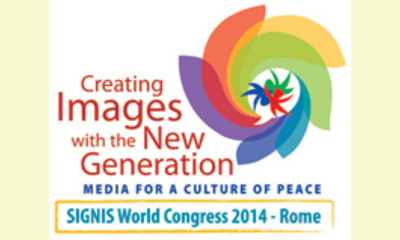|
|
More than 300 Catholic Communicators in Rome for the SIGNIS World Congress 2014
an article by Signis
More than 300 Catholic communicators from over 80
countries are converging to Rome for the SIGNIS
World Congress 2014 on the theme “Media for a
Culture of Peace: Creating Images with the New
Generation”. The Congress opens on 25 February in
the presence of Archbishop Claudio Maria Celli,
President of the Pontifical Council for Social
Communications.

click on photo to enlarge
Introducing the event, Archbishop Celli stated that
the Congress is an answer to “the reality of our
times.”
“During three days we will be confronted with the
changes taking place in our culture and the many
expectations of hope in the world, dedicating
particular attention to younger generations, and
thus to our future.”
The President of the Pontifical Council for Social
Communications encourages Catholic communicators
to respond to the Pope’s challenge: “The
revolution taking place in communications media
and in information technologies represents a great
and thrilling challenge; may we respond to that
challenge with fresh energy and imagination as we
seek to share with others the beauty of God.”
(Pope Francis, Message for the 48th World
Communications Day)
“Fresh energy and imagination is what Pope Francis
is asking from us if we are to meet the challenges
of the future with “dedication and serious
professionalism,” concluded Archbishop Celli.
The Congress will offer conferences, workshops,
screenings and events aimed at Catholic media
professionals from different audiovisual areas and
expertise. They will tackle, among others, social
media, journalism, social marketing, cinema and
spirituality, social documentaries, multimedia
radio, communications training and media
education. The opening address, given by Fr
Antonio Spadaro SJ, will reflect upon the ethical
and spiritual dimensions of the emerging digital
culture.
The programme is available here.
For Augustine Loorthusamy, the President of
SIGNIS, the World Catholic Association for
Communication that networks Catholic media
professionals from over 100 countries around the
world, the programme of the Congress will give
many opportunities to “renew our thinking”.
“Every Congress is an opportunity to celebrate the
richness of our diversity as a truly worldwide
association of communicators. I am sure that this
Congress will see old friendships renewed and new
ones formed as we learn from each other are
challenged and stimulated to think afresh. Sharing
and listening to one another across generations we
can start to co-create a new and effective SIGNIS
that is ready to respond creatively and positively
to the challenges of a fast-changing multimedia
and digital world.”
“Let us hope that the experience of this Congress
will help us to return to our various
communications endeavours renewed, energised and
inspired!” he concluded.
Follow and share the SIGNIS World Congress 2014
on:
www.signisworld
congress.net
www.facebook.com/signisworld
www.youtube.com/signisworld
http://www.twitter.com/#SIGNIScongress
(Click here for a Spanish version of this article or here for a french version)
|








|
DISCUSSION
Question(s) related to this article:
Do the mass media give any attention to the culture of peace?, or just to the culture of war?
* * * * *
Latest reader comment:
The articles from Africa describe good examples, among the rare ones, of media attention to the culture of peace. Not by accident that it is in Africa. In fact, the countries of the North have traditionally tried to keep the countries of the South from having their own media. For some history, see the history of UNESCO's attempt to aid the media of the South.

|
|









